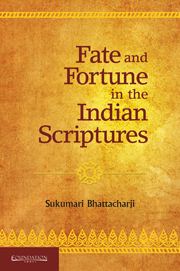Book contents
- Frontmatter
- Contents
- Preface
- Introduction
- Chapter 1 Inception
- Chapter 2 Rebirth and Transmigration
- Chapter 3 Karman and its Consequences
- Chapter 4 Karman, Fate and Free Will
- Chapter 5 Fate, Eschatology and Liberation
- Chapter 6 Premonitions and Presages
- Chapter 7 Deflection: Remedial Measures
- Chapter 8 Vicarious Deflection
- Chapter 9 Fate and Human Endeavour
- Bibliography
- Index
Chapter 4 - Karman, Fate and Free Will
Published online by Cambridge University Press: 05 October 2014
- Frontmatter
- Contents
- Preface
- Introduction
- Chapter 1 Inception
- Chapter 2 Rebirth and Transmigration
- Chapter 3 Karman and its Consequences
- Chapter 4 Karman, Fate and Free Will
- Chapter 5 Fate, Eschatology and Liberation
- Chapter 6 Premonitions and Presages
- Chapter 7 Deflection: Remedial Measures
- Chapter 8 Vicarious Deflection
- Chapter 9 Fate and Human Endeavour
- Bibliography
- Index
Summary
BOTH rebirth and karman stem from death, the trauma and uncertainty associated with death. The excavation of prehistoric burial sites bring to light man's worries and concerns regarding death, his attempts to offer comforts to the departed soul. Life can never accept death, the negation of life. “Man has always reacted to death. He did not accept it, convinced as he was that it did not belong to the original plan of human life. So we find several myths explaining how death came into the world.” One reaction to man's spiritual rejection of death was application of magic for prolonging life, necromancy, attempts at rejuvenation through pseudo-chemistry etc. Underneath such endeavours is the belief that death is extraneous to the schema of life. Man held that the ultimacy of the termination of life in death was unacceptable. Also the appearance of the departed in dreams assured him that the essential man i.e. the spirit lived on, despite the death of the body. Hence the universal belief in an existence of after-life: in heaven, paradise, purgatory, hell, an astral body or the spirit form. “The care taken over the disposal of the dead indicates a deeply held conviction that provided the appropriate steps are taken, death could be regarded as a transitional slate… The oldest astronomical texts now known are found on the lids of wooden coffins dating from the Ninth Dynasty (c 2150 B.C.). They are called ‘diagonal star clocks’ or diagonal calendars and they give the names of the stars associated with the respective decans.”
- Type
- Chapter
- Information
- Fate and Fortune in the Indian Scriptures , pp. 78 - 113Publisher: Foundation BooksPrint publication year: 2014

